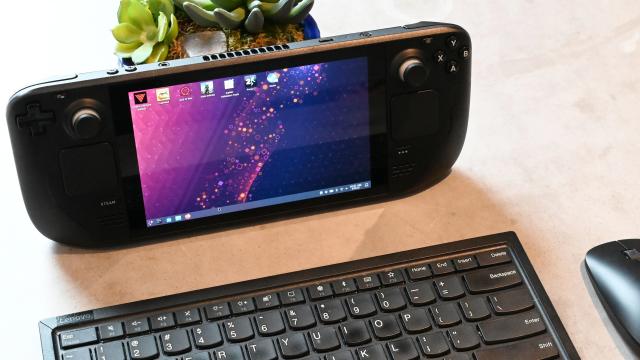Even with the Xbox being over 20 years old (let that sink in), Microsoft has yet to jump into the booming gaming handheld console market. Still, at least its employees — both past and present — have made it clear that the company is more than capable of creating a dedicated platform for gaming handhelds, which is important as handhelds like the Steam Deck continue to push what exactly a PC even is.
As first reported by The Verge, Microsoft leaker WalkingCat on Twitter recently shared internal videos of company devs discussing the proliferation of handheld gaming PCs and their own efforts to get Windows to work well in a handheld format. The video reportedly came from a Microsoft hackathon last September, where the developers said that past fan deployments of Windows on Steam Deck were not “prime time” due to lack of control optimizations and game compatibility.
https://t.co/OWiw0f2k2v pic.twitter.com/RdSGMmhgBd
— WalkingCat (@_h0x0d_) April 13, 2023
The Microsoft employees said they worked with a separate community of developers to create Steam Deck controls for Windows. The developers then showed how they could get Windows to run with a custom UI inside Valve’s popular handheld. They also created a quick launcher for users to navigate between an app store and the games themselves.
It was all an effort to show to Microsoft what the company would minimally need to make its own handheld console software. A user interface developed by Dorothy Feng, now a senior UX designer at Microsoft, showed how it could support Xbox as well as Steam, Epic Games Store, and other apps like Spotify and Discord. The presentation mentions a minimum product would need your basics, like a suitable touch keyboard, UI scaling, control mapping, and a “robust launcher” for quickly accessing games.
— WalkingCat (@_h0x0d_) April 13, 2023
The hackathon devs wrote “Windows and Xbox app users deserve this, need this… A Windows gaming experience, dialed-in to handhelds, represents a new revenue stream, as well as being a goodwill gesture to the PC gaming community.”
Xbox Cloud Gaming already supports Steam Deck through Microsoft Edge, and users have already hacked Windows 11 onto Steam Deck, though with mixed results. Valve released Windows drivers for the device back in March last year, but there were noted issues with some games’ performance and compatibility. Steam Decks now support both Windows 10 and 11, and users themselves have figured out a workaround for heat issues by making TDP controls (and other settings) accessible in-game.
Still, even that lacks the robust quick access and (and optional plugin) menu options already present in SteamOS. Meanwhile, non Steam Deck consoles like the Ayaneo Geek are already coming out with the same Windows 11 experience you’ll get on laptops and desktops, but as we discovered in our review, built-in proprietary apps like Aya Space aren’t exactly a replacement for an OS built for a handheld from the ground up.
So is Microsoft actually working on a UI specifically for handheld gaming consoles? So far, we haven’t seen hide nor hair of a handheld version of Windows. One of the engineers cited in the video, Hayden McAfee, worked on the Controller Bar for Windows 11, though according to his LinkedIn, he is no longer with Microsoft.
Gizmodo has already pointed out the gross lack of new gaming handhelds from legacy console makers Microsoft, Sony, and yes, even Nintendo. The market is currently booming with new products like the Razer Edge and the Logitech G Cloud supporting cloud-based gaming on the go. There is certainly a demand for more handheld console-specific software.
And of course, Xbox could eventually decide to make its own handheld console that can iterate on all the strides Valve has made with the Steam Deck. At this point, any new handheld or handheld software should have a quick-access menu, brought up with a button, with easy access to at least system-wide Fidelity FX Super Resolution (FSR) for upscaling and TDP controls. Bluetooth and fan controls would also be wise to make easily accessible, as unofficial plugins have done for the Steam Deck.

Leave a Reply